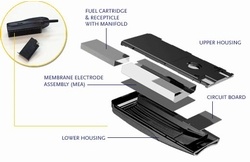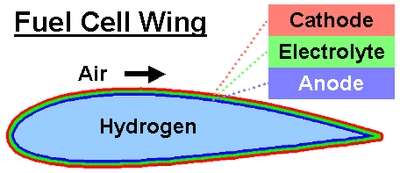Diamond Aircraft, Intelligent Energy, ATP Are In
 Boeing has announced its
partners for a demonstrator airplane project aimed at exploring the
use of fuel cell technology for future aerospace applications.
Boeing has announced its
partners for a demonstrator airplane project aimed at exploring the
use of fuel cell technology for future aerospace applications.
The research project, led by the Boeing Research and Technology
Center in Madrid, Spain, includes Intelligent Energy (United
Kingdom), Diamond Aircraft Industries (Austria), the Spanish
companies Sener and Aerlyper, and Advanced Technology Products,
from the United States.
The project will evaluate the potential application of fuel cell
technology - which is cleaner, quieter and more efficient than
current gas turbine technology - for future commercial airplane
products. As part of the evaluation, the project will develop and
flight-demonstrate an electric-motor- driven airplane powered by
fuel cells.
 With respect to the five partners
collaborating in the project, Diamond Aircraft of Austria will
supply the demonstrator airplane, based on a certified Katana
Xtreme motor-glider (in Europe called the Super Dimona);
Intelligent Energy of the United Kingdom will provide the Proton
Exchange Membrane fuel cell hardware and technical support; Sener
will design and build a fuel cell controller unit to be used in
research activities; Aerlyper will integrate the electric motor
into the airplane and perform airframe modification work; and ATP
will supply the motor, batteries, and controllers to complete the
electric propulsion system, and perform the flight testing of the
airplane.
With respect to the five partners
collaborating in the project, Diamond Aircraft of Austria will
supply the demonstrator airplane, based on a certified Katana
Xtreme motor-glider (in Europe called the Super Dimona);
Intelligent Energy of the United Kingdom will provide the Proton
Exchange Membrane fuel cell hardware and technical support; Sener
will design and build a fuel cell controller unit to be used in
research activities; Aerlyper will integrate the electric motor
into the airplane and perform airframe modification work; and ATP
will supply the motor, batteries, and controllers to complete the
electric propulsion system, and perform the flight testing of the
airplane.
"Boeing will collaborate with these companies to investigate the
integration of fuel cells into aerospace vehicles, a potential new
field of application, which promises to reduce emissions while
increasing the efficiency of electrical power generation," said
Miguel Hernan, managing director of the Madrid Center. "Research
into environmentally acceptable technologies is a key focus for the
Center's work in Europe."
In addition to the five partners involved, two Spanish universities
will also collaborate in this project. The Polytechnic University
of Madrid will test a sub-scale version of the fuel cells that will
power the demonstrator airplane and the Polytechnic University of
Catalonia will work to understand the possible failure modes of
this completely new form of airborne electrical power
generation.
 Work to integrate the
fuel cells into the demonstrator airframe is expected to begin at
the end of summer 2003. This would enable a possible flight test in
late 2004 or early 2005. While test results are not expected to
allow for any near-term applications of the new technology to
production aircraft, they are expected to contribute to the
eventual use of this technology in aircraft to provide cleaner,
more efficient performance.
Work to integrate the
fuel cells into the demonstrator airframe is expected to begin at
the end of summer 2003. This would enable a possible flight test in
late 2004 or early 2005. While test results are not expected to
allow for any near-term applications of the new technology to
production aircraft, they are expected to contribute to the
eventual use of this technology in aircraft to provide cleaner,
more efficient performance.
In addition to being inherently cleaner and quieter than current
technology gas turbines, fuel cells can generate approximately
twice as much electricity from the same amount of fuel. Unlike a
battery, which needs to be recharged, fuel cells keep working as
long as the fuel lasts. While fuel cells and electric motors will
not replace jet engines, they could potentially replace gas turbine
auxiliary power units, which provide electricity and air for
airplane systems.
 Airborne-Flight Training 05.09.24: ERAU at AIAA, LIFT Diamond Buy, Epic A&P
Airborne-Flight Training 05.09.24: ERAU at AIAA, LIFT Diamond Buy, Epic A&P ANN's Daily Aero-Term (05.07.24): Hazardous Weather Information
ANN's Daily Aero-Term (05.07.24): Hazardous Weather Information Aero-News: Quote of the Day (05.07.24)
Aero-News: Quote of the Day (05.07.24) NTSB Final Report: Cessna 150
NTSB Final Report: Cessna 150 Aero-News: Quote of the Day (05.08.24)
Aero-News: Quote of the Day (05.08.24)





